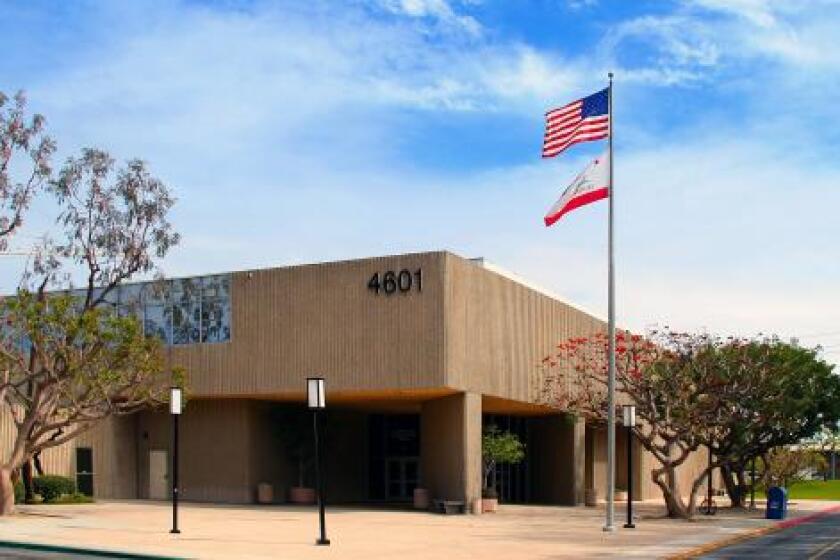THE BELL CURVE:Family is a far cry from criminal
- Share via
When Margarita Mendoza first appeared on the doorstep of the home of Jim and Kathryn Helfrich in Newport Beach almost 30 years ago, she was 19 years old, spoke only Spanish and was — although she didn’t know it — pregnant. Margarita was introduced to the Helfrichs by her aunt who cleaned their 4,000-square-foot house, filled to overflowing by six active children. A few weeks later, Margarita was doing the job alone. It took 10 hours a day, once a week. She missed only one cleaning day that year, the week of Thanksgiving, when she gave birth to Laura, her first-born.
“We needed the money,” she explained, because her husband, Mauro, was losing too many working days as a gardener because of heavy rains.
When the Helfrich kids were raised and gone and the parents moved to smaller quarters in Bayshore, Margarita came along. She’s been a fixture in the extended Helfrich family for three decades, along with the households of many of her other original customers. During that time, she and Mauro have bought a house and put three kids through college — and next year, their youngest, Elizabeth, will be going.
So, Costa Mesa Mayor Allan Mansoor, I’d like you to meet once illegal immigrants Margarita and Mauro Mendoza.
In March of 1977, they — just married — paid a coyote $350 apiece to lead them, along with 16 other illegal immigrants, into the United States to seek work and a chance for the children they wanted to have. They crossed the border on foot and walked for two days in four-hour spurts, sandwiched between sleep. They spent many hours holed up in a trash dump and walking without shoes so they wouldn’t disturb listening dogs. They were able to connect with a van that took them to Los Angeles. A bus brought them to Costa Mesa and Margarita’s aunt.
Almost from the day they arrived, Margarita and Mauro have been working long hours. They have groomed the yards and gardens and cleaned and polished the houses of Newport-Mesa, with, as Jim Helfrich said “ethics, hard work and elegance. They have always demonstrated the highest level as a family.”
On Aug, 1, 1989, the Mendozas were granted amnesty under a new law passed by Congress. They had no trouble getting letters from sponsors, and each of them proudly came away with a green card and a driver’s license. By that time, both had attended night school to learn English (Margarita was proficient, Mauro was struggling), and Mauro — with the help of Jim Helfrich, who speaks fluent Spanish — had started his own gardening business. And they had settled down to a process of putting aside earnings to allow their four children to have the option of college.
“I wish I could have done the same,” says Margarita. “I didn’t have the opportunity for college, but I wanted it to be possible for all of my kids. But I also never asked for special help for them. I figured if I want to have kids, then I have to pay for them.”
The two oldest, Laura and Martha, have graduated from Cal State Long Beach and UC Santa Barbara, respectively, and are gainfully employed. Martha was recently married with a send-off party from the Helfrichs. The only Mendoza son, Alberto, is a senior at San Francisco State University and will, says Jim Helfrich, “have an impact one day.”
And their youngest daughter, Elizabeth, is a high school senior thinking about a college for next year.
The Mendozas have repaid the opportunities they have found in this country in many ways. One of the more creative has been their Christmas celebration. Twice they have rented community rooms in a local hotel to hold a party for their friends and customers (Margarita says they’re thinking about doing it again this year), and regularly they brew up an enormous supply of tamales and drive about on Christmas Eve passing them out. But the primary way they have offered thanks has been their service and loyalty to the clients who have admired and embraced them over the years.
This is the other side of the illegal immigration question, the enormous counter balance to the draconian picture we are offered by the people — including the mayor of Costa Mesa and his clique — who would portray them as criminals who should be punished by throwing them out of the country. This is an incredibly complex matter that requires balanced thinking and action. The Mendozas are legal and safe, but there are hundreds of thousands of hard-working people like them who aren’t and who came here in desperation and were warmly received by local employers. Dealing with them with fairness while we prevent further encroachment requires statesmanship, not thinly veiled racist rhetoric.
Margarita has been giving loving care to our house for several years, and I find it embarrassing that someone else had to call my attention to her history and her remarkable achievements in this country. I had never before taken the time to stop and talk with her beyond the minutiae of her chores. That was my loss, and I’m grateful to have had that pointed out to me.
As Margarita told me simply, “Not all immigrants are bad.”
Indeed they aren’t.
All the latest on Orange County from Orange County.
Get our free TimesOC newsletter.
You may occasionally receive promotional content from the Daily Pilot.



